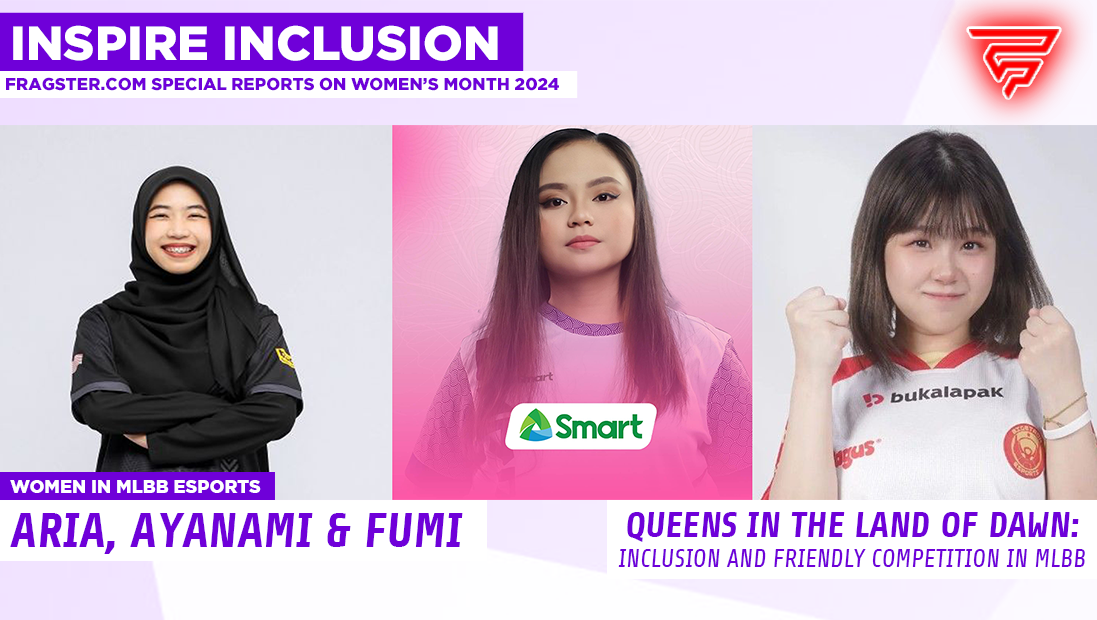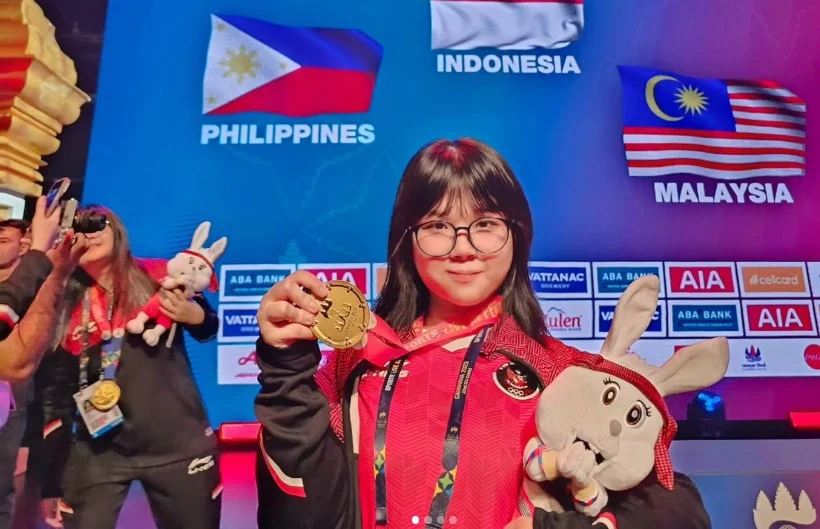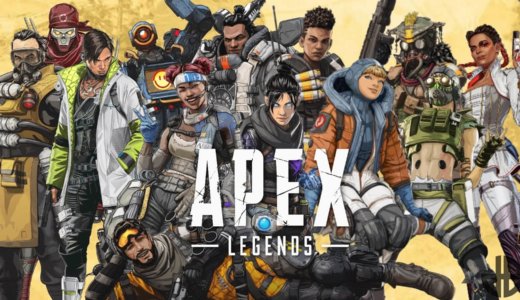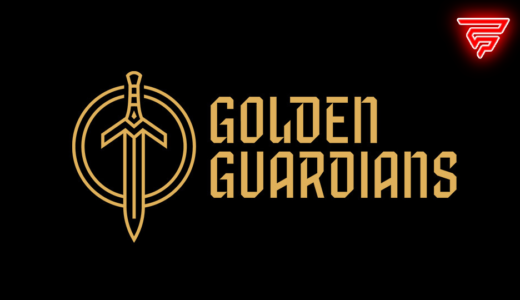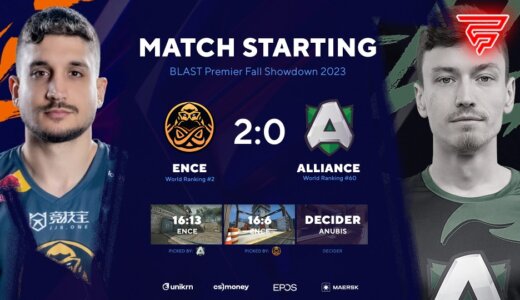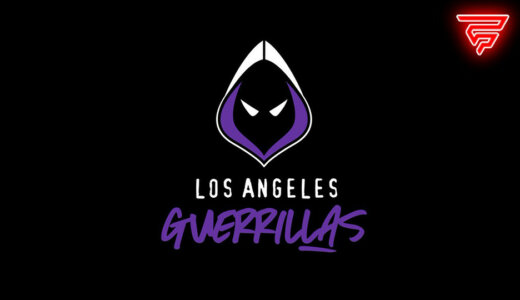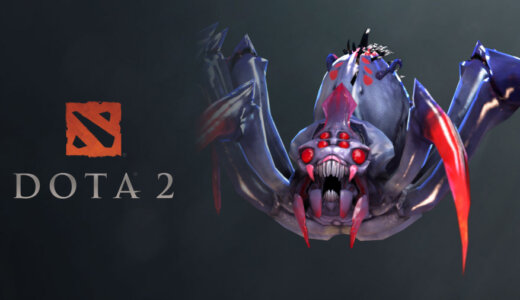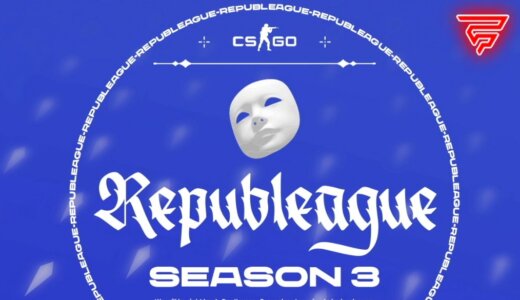In one of the most competitive regions for mobile gaming in the world, women esports pros are also making their own mark.
From Southeast Asian Games medalists to esports pioneers, women have proven that the Land of Dawn can provide many opportunities for inclusion and diversity in esports.
Fragster talked to three key women in the SEA MLBB pro scene: Gwyneth “Not Ayanami” Diagon, Sharifah “Aria” Fakrrurozi, and Venny “Fumi” Lim – three iconic women who have proven that even in the strongest Mobile Legends: Bang Bang regions in the world, great women can also hold the keys to victory for inspiration and inclusion.
AYANAMI, ARIA AND FUMI: GAMER GIRLS IN THE LAND OF DAWN
Fumi in the 32nd Southeast Asian Games. (PHOTO CREDIT: YODU)
Ayanami, Aria, and Fumi have all been exposed to gaming from a young age, and in a generation where gaming is literally a part of everyday life – they learned how to game and had people who influenced them to pursue careers in esports.
For Not Ayanami, who hails from the Philippines, MOBA gaming started for her as early as the second grade. “It was my father’s and brother’s hobby and I adapted it,” she told Fragster in an email interview, “Growing up, social media was technically my gateway to esports. Posts about tournaments and recruitments were blooming then,” she says.
Aria, who is one of Malaysia’s esports pioneers for women, says her brother also influenced her to play games. “My brother initially taught me how to play MLBB, and with my friends’ assistance, I gradually started entering MLBB competitions,” she says.
Mobile Legends: Bang Bang was the first MOBA game that Indonesian esports pro Fumi first played.
“I started playing games when I was just a little girl, often accompanying my father to internet cafes, but only playing funny games. Then the first time I played a MOBA game was Mobile Legends: Bang Bang and that was because my younger brother taught me.
I only got to know esports after I got to play deeper into the game. I studied the game by pushing rank in high level, and I got to know a lot of good people who turned out to work in the world of esports and from there I got an offer to pursue my dream,” Fumi said.
Now, all three women are pursuing different careers as pros in MLBB esports.
Not Ayanami has been playing for the female division of Smart Omega, a well-known esports squad in the Philippines. As part of Omega Empress, she was able to help secure a silver medal for her home country during the 32nd Southeast Asian Games in Cambodia.
As for Aria, she is currently part of Team HAQ Ladies and is widely seen as one of Malaysia’s pioneers for women in esports. She was part of the team that got bronze also in the 32nd Southeast Asian Games.
Fumi, meanwhile, is part of Bigetron Era – one of two all-women teams that will debut in MDL Indonesia Season 10. She and her Team represented Indonesia and won gold in the same SEA Games in Cambodia.
Ayanami, Aria and Fumi all say, all they had to do was to find a way to break through the proverbial glass ceiling and start somewhere – which they eventually succeeded in doing by turning pro in their respective countries all three of which have a strong mobile esports following.
“Initially, I never thought a career would be possible,” Ayanami says. “But since it was a passion of mine since I was a kid and the industry was continuously blooming, I decided I will give it my best shot while I was at it and see where it would take me.”
And it is in that best shot where she continues to win in both local and international tournaments as part of one of the Philippines’ biggest esports orgs.
As for Aria, she had been a part of some of Malaysia’s pioneer all-female esports clubs, such as the HomeGirls and Madness Ariel.
“I felt like this was a once-in-a lifetime chance, so I did my best to be consistent in every training session and tournament,” she said.
Fumi, meanwhile, cites her friends and the stability that esports gives her as reasons why she pursued playing pro. “I feel like I have a lot of friends, and a lot of people like me in esports. This made me decide to pursue a career in esports and esports is also a very profitable hobby of mine,” Fumi says.
ON DEALING WITH HATE
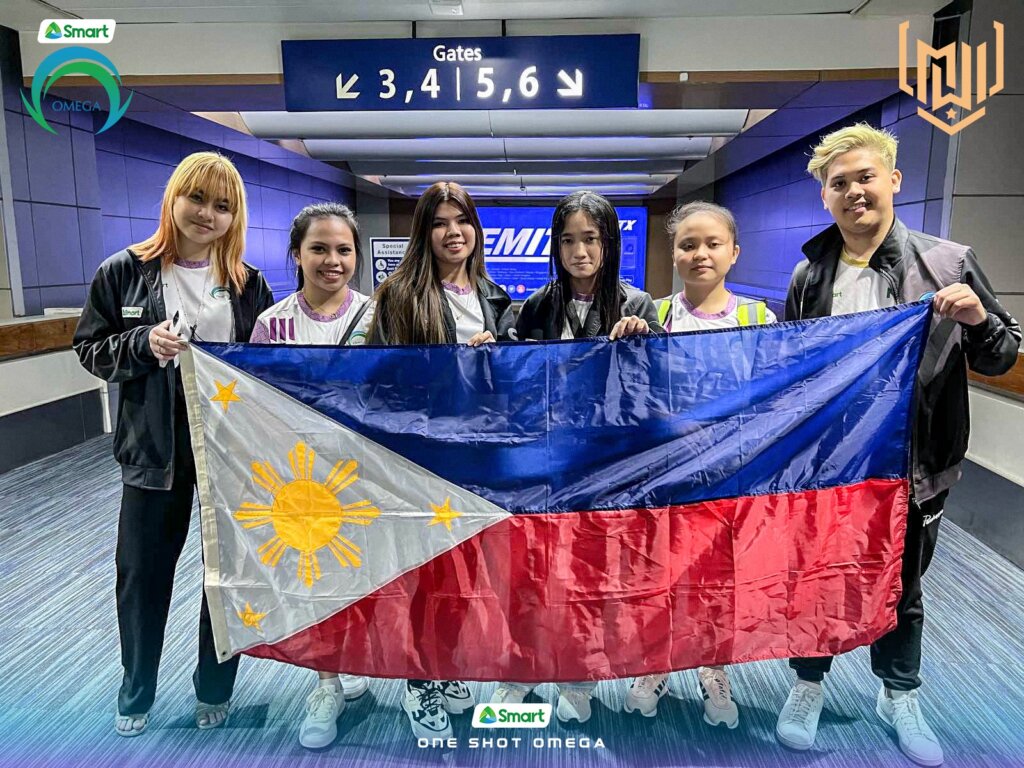
Fumi, Aria and Ayanami have also had their fair share of people looking down on women whenever they play games.
Aria says, promoting inclusivity, respect and equality is essential for everyone in the esports ecosystem.
“To address these issues, it’s essential for the gaming community, including players, organizations, and fans, to promote inclusivity, respect, and equality for all genders. This can be achieved through education, awareness campaigns, enforcing codes of conduct, and supporting initiatives that empower women in esports.”
She believes, highlighting the success of female players in the game can help defeat stereotypes and show that talents and skills are not limited by gender.
“By showcasing diverse role models and celebrating their achievements, we can inspire more people to pursue their passions in gaming and esports, regardless of gender,” she added.
Fumi agrees, saying, “the way to deal with sexism in the world of esports is to mingle or play with men and provide proof that we are the same as them, or even have a better skill set.”
That latter statement is what Ayanami always clings to, as she is more vocal against sexism and misogynistic remarks.
“There’s not a day in our training that we don’t encounter sexist and misogynistic remarks especially from RG (ranked game) boys, Ayanami says.
Ayanami also tries to respond verbally in-game, and if they win or if their opponents say offensive remarks, she posts the battle results – proof that sometimes in the Land of Dawn, the last man standing is a woman.
“I’m never tolerant with sexism. I plan to train harder and be the best in what I do in MLBB so no one can ever degrade female players again, at least not on my watch,” Ayanami said.
GAMER INSPOS
Aria’s role model in entering the world of esports is StarCraft II pro player Sasha “Scarlett” Hostyn, who is the first woman to win a major StarCraft II tournament in the esport’s history.
“Her achievements have helped promote diversity and inclusion in esports and gaming, which can influence perceptions and opportunities for women in the industry,” Aria says.
As for Fumi, her female friends in her early esports career were the ones who inspire her.
“I struggled from zero until now and I can be like this with all the achievements I have and I always look back at what my struggles were like before. In esports, in the past, ladies’ players didn’t get more opportunities and we were always struggling with our own problems, for example we had difficulty finding scrim opponents,” Fumi says.
She adds, “I look back at my and my friends’ struggles at the beginning, this makes me not easily give up, have a strong mentality, and also have bigger dreams.”
While not having a specific role model, Ayanami says, it is the absence of women’s representation in esports that she uses as fuel to better every day.
“I truthfully didn’t have a role model when I started taking this path. We don’t have much female role models in the Philippines, especially on the professional esports scene. I grew up facing stereotypes and discrimination with my gender in the gaming world, people saying that it’s a man’s world, and that gaming isn’t for girls,” Ayanami says.
“However, it was the absence of such representations that ignited my thirst to thrive. I wanted to abolish discrimination and prove everyone otherwise,” she adds.
ON HOW MLBB OPENED OPPORTUNITIES FOR INCLUSION IN WOMEN’S ESPORTS
Fumi recounts when she started going pro in 2019, saying, “the world of women in esports in my country, women are always looked down upon, we are told to just play with dolls. In fact, many people think that my MLBB account is the result of a jockey, people always don’t believe that it is me who plays my account. That was a time when women rarely played Mobile Legends,” she says.
Fast forward to 2024 – and the women’s esports scene is slowly booming, especially in the Mobile Legends: Bang Bang esports ecosystem.
In July, the biggest event for MLBB women’s esports – the 2024 MLBB Women’s Invitational or MWI – will be hosted as part of the Esports World Cup in Saudi Arabia.
The said tournament will feature a US$500,000 prize pool – the biggest in MWI and women’s MLBB esports in history.
Ayanami says, “MLBB’s accessibility opens up opportunities for all kinds of people who want to play and enjoy the game. With this kind of diverse environment, female players would feel more included in the industry, thus having a space for them to showcase their skills.”
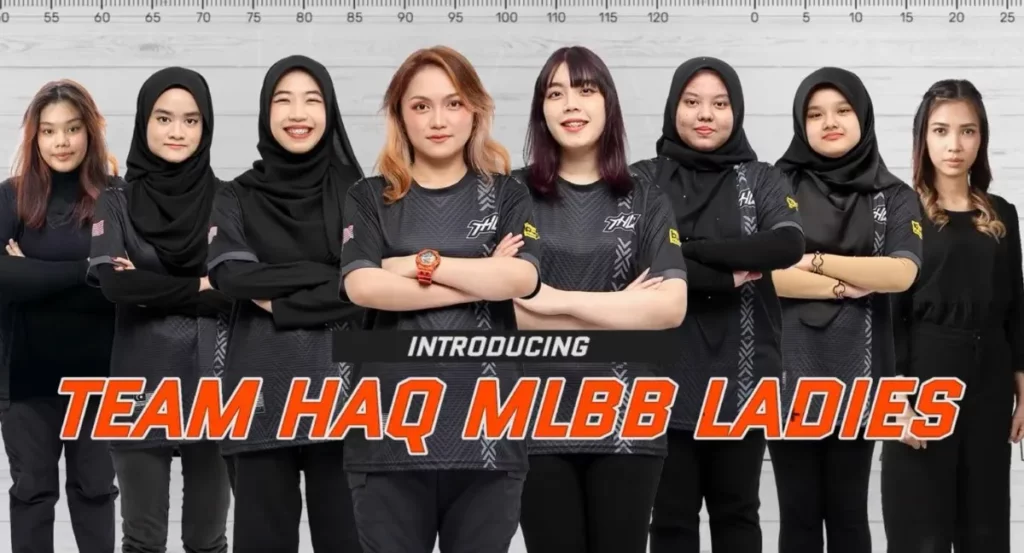
Aria added, “Mobile Legends: Bang Bang can have a significant impact on influencing female gamers by providing them with accessible platforms to compete, showcase their skills, and be part of a supportive community. Mobile gaming, in particular, has lower barriers to entry compared to traditional PC or console gaming, making it more inclusive for players of all backgrounds and genders,” she says.
“As esports continues to grow in popularity and visibility, it helps break down stereotypes and encourages more women to participate in competitive gaming. Additionally, successful female players and role models in esports can inspire others and contribute to the diversification of the gaming community,” Aria added.
Aria, Ayanami and Fumi all look forward as MLBB pros representing not just their countries, but as the proverbial queens in the Land of Dawn.
As for Fumi, she believes it is important for women to be recognized in esports – especially in situations where the patriarchy is the norm.
“Firstly, maybe I see that in my country women are underestimated and not given more space to compete in esports, then secondly this could be a place to prove that we women are also able to compete or are even better than the men there. Lastly, more on the inclusivity side, it is not ideal if a title has to limit one gender when holding a tournament or league,” Fumi says.
“Other than to promote diversity, recognizing women in esports helps pave the way for aspiring gamers that the esports scene is not a complete dead end for female players – that even though it’s a male-dominated industry, it is never impossible for women to play competitively,” Ayanami said.
“Recognizing and supporting women in esports promotes diversity and inclusion within the gaming community. It creates a more welcoming and equitable environment where all individuals, regardless of gender, feel valued and respected,” Aria said.
“After that, it encourages women to participate in esports, which helps uncover and develop untapped talent. By providing opportunities and resources for women to compete and excel in gaming, titles can contribute to the growth and success of the esports industry as a whole,” she added.
